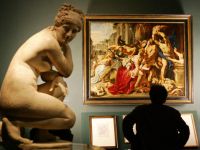AUC History Chair leads Committee of Documenting the Egyptian Revolution

Khaled Fahmy, Professor and Chair of the Department of History at The American University in Cairo has been selected to head the Committee of Documenting the Revolution launched by the Egyptian National Library and Archives. According to Fahmy, the goal of the committee is to gather and preserve all documentary evidence of the revolution for future generations. “In previous episodes in history, such as in the 1952 revolution, we, as historians, had little documentary evidence,” noted Fahmy. “Thus, it is natural that the Egyptian National Library and Archives, the main institution in the country responsible for keeping and preserving documents, would be concerned about what is happening now for the sake of future historical research.”
The committee consists of six volunteer members including Fahmy, and history and political science professors from Helwan and Cairo universities, as well as the director of the National Archives. The group is charged with six tasks. The first, which Fahmy describes as “huge,” is to collect oral testimonies from people who participated in the revolution. An oral history center will be launched for this particular mission. This center will be directed by Hania Sholkamy, an anthropologist at AUC’s Social Research Center.
Other tasks include collecting digital material produced during the revolution, including photos, videos, and audio recordings. “We are also interested in everything the press, local and international, has published during the revolution. Also, we are concerned with collecting testimonies of those people who planned for the revolution, whether ordinary youth or activists,” Fahmy explained.
Fahmy pointed out that another task of the committee is to preserve different websites and video clips that played a role in the revolution. “These might be deleted over time and we need to find a way to preserve them for posterity,” he said. The final task is to collect all official documents and letters pertaining to the revolution from various governmental agencies. The committee is seeking documents from the ministries of interior, information, defense; the State Security Intelligence body (amn al-dawla); and Egyptian TV. “We want the Egyptian National Library and Archives to be the reservoir for these important documents,” Fahmy emphasized. “We are not a fact-finding committee, but we are keen on contacting these bodies and institutions to send us their documents, and reports when they finish with them. This is the place to keep them,” Fahmy said.
Fahmy noted that the committee’s job is not to produce a narrative about the revolution, but rather, to collect material for people who want to write a narrative. “For this reason, we want to be as transparent as possible, as accurate as possible, as consistent as possible and as exhaustive as possible,” he said.
Fahmy praised other individual and institutional initiatives to document the Egyptian revolution, including AUC’s initiative, The University on the Square: Documenting History in Real Time. “The more, the merrier,” Fahmy commented, “all of this documentation will definitely benefit the end user. The Egyptian National Library and Archives will work on this, but it might be missing in some parts. These other initiatives might be completing these missing parts, and focus on things that we are not focusing on.”
Background Information
American University of Cairo
Founded in 1919, AUC is a leading English-language, American-accredited institution of higher education and center of intellectual, social and cultural life of the Arab world. Its community of students, parents, faculty and staff, trustees, alumni and other generous sponsors represent more than 60 countries. The University stands as a crossroads for the world’s cultures and a vibrant forum for reasoned argument, spirited debate and understanding across the diversity of languages, facilities and human experiences.






